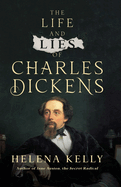
Few authors have ever approached the iconic status of Charles Dickens, the most successful and prominent author of his day, whose work engendered copious review and commentary, and whose personal life inspired intense curiosity. Autobiographical interpretations of his literary production were a common approach to Dickens scholarship of the era, which the author directed and encouraged, in part through sanctioning an official biographer, his friend John Forster. Furthermore, Dickens "put considerable effort," Helena Kelly writes in The Life and Lies of Charles Dickens, "into controlling what people would think of him after his death."
Kelly (Jane Austen, the Secret Radical) avails herself of every corner of the Dickens archive, some of which is only more recently available, and doesn't allow herself to be misdirected by either the repeated falsehoods of earlier biographers or by Dickens himself. She skillfully makes her case across Dickens's life and work to show how he contrived to control the narrative around his life and describes "his relief at having found a way to write about personal matters while protecting his brand, the comforting knowledge that Forster was already primed with a selective version of his life which, while not contradicting what was already known, guided people away from all the really sensitive topics."
Kelly uncovers and explains likely truths about Dickens's birthplace, his parents' financial struggles, his multiple infidelities, his "borrowing" of literary material, and his medical conditions. This detailed and well-documented study, confidently and entertainingly written, is perfect for Dickens's fans and literary historians alike. --Elizabeth DeNoma, executive editor, DeNoma Literary Services, Seattle, Wash.

